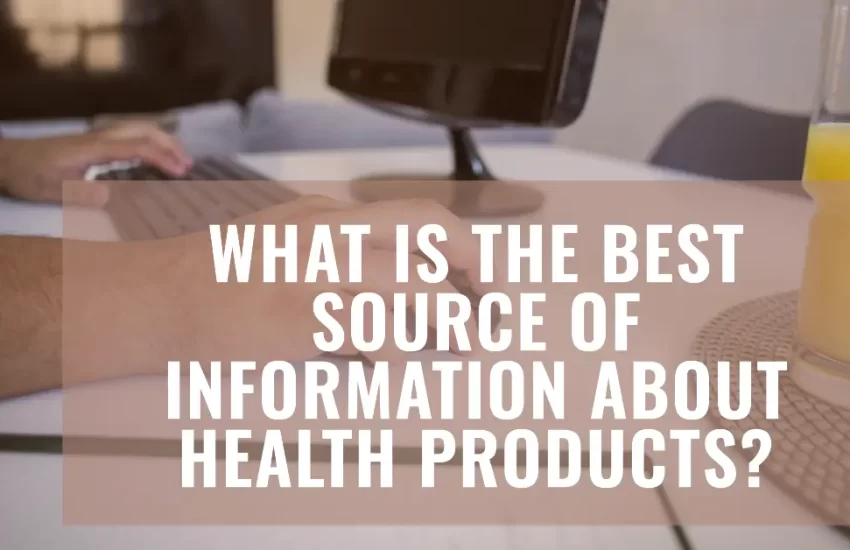In today’s digital age, finding reliable information on health products can be overwhelming. With countless blogs, websites, and social media influencers offering advice, it’s crucial to identify trustworthy sources to make informed decisions about your health. This article will explore some of the best sources of health product information, ensuring you make choices based on credible data.
1. Government Health Websites
Government health websites are some of the most reliable sources of information on health products. These platforms are backed by scientific research and provide updated information on various health concerns, treatments, and products.
Examples of Trusted Government Health Websites:
- Centers for Disease Control and Prevention (CDC): Known for its comprehensive coverage on diseases, vaccines, and product safety.
- National Institutes of Health (NIH): Provides a wide range of health information including research on supplements and others.
- Food and Drug Administration (FDA): Focuses on the regulation and safety of drugs, medical devices, and supplements.
2. Peer-Reviewed Medical Journals
Medical journals provide evidence-based information from studies conducted by experts in the field. Peer-reviewed means that the research is thoroughly evaluated by other professionals before publication, ensuring that the data is reliable.
Popular Peer-Reviewed Journals Include:
- The New England Journal of Medicine: One of the most prestigious journals covering all areas of clinical medicine.
- The Lancet: Offers detailed studies on global health concerns, including the efficacy of health products.
- JAMA (Journal of the American Medical Association): A trusted source for insights on drugs, treatments, and other health-related products.
3. Health Product Reviews and Consumer Reports
Consumer reviews can provide firsthand experiences about health products, although they should be taken with caution. While they offer practical insights, the credibility of these reviews depends on the source.
Reliable Platforms for Health Product Reviews:
- Consumer Reports: An unbiased review platform that rigorously tests and reviews products, including health-related items like supplements, fitness equipment, and more.
- Mayo Clinic: Known for its authoritative advice on medical treatments and products, the Mayo Clinic also provides consumer insights on supplements and over-the-counter products.
4. Professional Medical Associations
Medical associations often provide guidelines and recommendations based on the latest research. They also review health products for safety and efficacy, making their recommendations valuable for consumers.
Trusted Medical Associations:
- American Medical Association (AMA): Offers a wide range of health product reviews and recommendations.
- American Heart Association (AHA): Focuses on cardiovascular health, including diet, exercise, and product recommendations for heart health.
- American Academy of Pediatrics (AAP): Provides expert advice on child health products and treatments.
5. Registered Healthcare Professionals
Consulting healthcare professionals like doctors, pharmacists, and dietitians is one of the most direct and reliable ways to gather information about health products. These professionals are trained to assess product safety, effectiveness, and relevance to your personal health needs.
**How Healthcare Professionals
- Doctors: Provide personalized advice based on your medical history and current health conditions.
- Pharmacists: Offer expert knowledge on medications, supplements, and potential interactions.
- Dietitians: Guide you on the best dietary supplements or products tailored to your nutrition needs.
6. University and Research Institutions
Many universities and research institutes conduct independent studies to provide unbiased, scientifically valid data. These institutions often publish their findings, providing a wealth of reliable information.
Examples of Renowned Research Institutions:
- Harvard Medical School: Known for its research on supplements, medications, and overall health.
- Cleveland Clinic: Offers extensive research-based articles on a wide range of health products.
- Johns Hopkins Medicine: Focuses on innovation and research in medical treatments and health products.
7. Health-Focused Non-Profit Organizations
Non-profit organizations are a great source of unbiased health information. Many focus on specific diseases or health concerns and offer evidence-based advice on products and treatments.
Top Health Non-Profit Organizations:
- The World Health Organization (WHO): A global leader in health product recommendations and safety guidelines.
- The American Cancer Society (ACS): Provides information on treatments and products for cancer patients, including medications, supplements, and supportive therapies.
- The Arthritis Foundation: Offers product reviews and recommendations for individuals with arthritis.
Conclusion
In the crowded and often confusing marketplace of health products, it’s critical to seek information from reliable sources. Government health websites like the CDC and FDA, peer-reviewed medical journals, and professional associations such as the AMA provide accurate, science-backed data. For those seeking product reviews, platforms like Consumer Reports and reputable medical institutions like the Mayo Clinic offer unbiased insights. Additionally, consulting healthcare professionals such as doctors and pharmacists can give you personalized advice tailored to your specific health needs.
